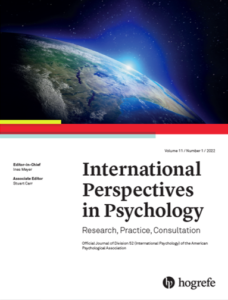
Spring (May) 2024 – Volume 28, Issue 2
Table of Contents
Presidential Feature
Division News
- Nancy Sidun, PsyD, ABPP receives Award for Distinguished Contributions to Psychology in the Public Interest
- Division 52 Council Rep Report
- Update from the Coalition for Psychology in Schools and Education
Global Perspectives and Collaborations
- Global mental health: A population health approach for enhancing mental wellness
- Libro Psicologia Clinica: Perspectiva Internacional
Member Activities
- Think Tank: Post-colonial challenges and future direction in cultural psychology
- Robots Revolutionize Learning: Special Education Soars with AI Companions
- Is the Concept of Peace Still Relevant in this Age of Political Polarization and Violent Aggression?
United Nations Activities
- How can psychologists promote human rights?
- Reflections on Psychology Day at the United Nations April 25, 2024
- Psychology Coalition at the United Nations: Continued expansion
Book Review
- Pandemic Providers: Psychologists Respond to Covid
Student News
Committee Highlights
- Update from the International Committee for Women
- International Environmental Justice Committee
Webinars
International Perspectives in Psychology
- Author Feature
Announcements and Opportunities
- Participate in Psi Chi’s Cross-Cultural, Open Science, Research Initiative!
- Conference and Workshops
Artistic Expressions
- The Discovery of Poison Ivy and Quick Sand
Note from the Editors

Feature of President Pina Marsico, PhD
Dr. Pina Marsico
President of Division 52 (International Psychology)
Interviewed by Antonio Valdivia
Dr. Marsico is an Associate Professor of Educational and Developmental Psychology at the University of Salerno, Italy. Dr. Marsico also holds professional affiliations in different countries such as Brazil (Federal University of Bahia), Denmark (Aalborg University), and Norway (University of Oslo). She is currently the President of Division 52 (International Psychology) of the American Psychological Association.
Through her leadership and professional activities, Dr. Marsico promotes the theoretical and empirical development of the field of Cultural Psychology in the Development and Education, this emerging perspective reflects about how important is for psychologists to be aware about the context and conditions surrounding their professional activities. For instance, to understand deeper the individual´s perception of wellbeing, psychologists should observe the culture, tradition, economy, or politics that impacts this perception to adjust better their professional services (assessment, counseling, etc.). Nowadays, international psychologists could take advantage of developing this cultural awareness for their current practice.
Aligned to this vision, at Division 52 Dr. Marsico promotes strengthening the existing psychological knowledge by means of examining how psychologists adapt and deploy their professional activities across different regions, particularly, by analyzing practices held by psychologists living in regions traditionally identified as Western (North America/Europe) or in other locations as Latin American countries.
Although Dr. Marsico is aware that there could be resistances from professionals to reflect and analyze on their own activities to those executed by colleagues from different countries, Dr. Marsico considers that natural openness and intellectual curiosity of professionals are valuable tools to achieve this endeavor.
Currently, Dr. Marsico’s efforts to demonstrate this scholarship is possible to reach are producing results that impact directly the American Psychological Association environment; this summer when APA’s Annual Convention runs, some work sessions (discussion panels, poster sessions, etc.) will be worked by the first time, in Spanish Language. This is a concrete strategy to boost conversations of professionals from Latin American countries to share experiences to professionals from other regions.
As a cultural vision is inherently related to a gender justice perspective, Dr. Marsico believes that it is necessary to support and increase leadership roles for female psychologists, thus it is important to nurture this empowerment, so that current gender balance reached at the practitioner stage levels up to spheres of influence to impact broadly our discipline. In this regard, Dr. Marsico acknowledges that her leading position is an opportunity to foster this balance and appreciates the support and collegiality she has received from past presidents of Division 52 to develop her presidential term.
To learn more about Dr. Marsico: https://docenti.unisa.it/023114/en/curriculum
—————————————-
Dra. Pina Marsico
Presidente de la División 52 (Psicología Internacional)
Por Antonio Valdivia
La Dra. Marsico es profesora asociada de Psicología de la Educación y del Desarrollo en la Universidad de Salerno, Italia. La Dra. Marsico también tiene afiliaciones profesionales en diferentes países como Brasil (Universidad Federal de Bahía), Dinamarca (Universidad de Aalborg) y Noruega (Universidad de Oslo). Actualmente es la presidenta de la División 52 (Psicología Internacional) de la Asociación Estadounidense de Psicología.
A través de su liderazgo y actividades profesionales, la Dra. Marsico promueve el desarrollo teórico y empírico del campo de la Psicología Cultural en el Desarollo e la Educación, esta perspectiva emergente reflexiona sobre lo importante que es para los psicólogos estar conscientes del contexto y las condiciones que rodean sus actividades profesionales. Por ejemplo, para comprender más profundamente la percepción de bienestar del individuo, los psicólogos deben observar la cultura, tradición, economía o política que impacta esta percepción para ajustar mejor sus servicios profesionales (evaluación, asesoramiento, etc.). Hoy en día, los psicólogos internacionales podrían aprovechar el desarrollo de esta conciencia cultural para su practica profesional.
Alineado con esta visión, en la División 52 la Dra. Marsico promueve el fortalecimiento del conocimiento psicológico existente mediante el examen de cómo los psicólogos adaptan y despliegan sus actividades profesionales en diferentes regiones, particularmente, analizando las prácticas de los psicólogos que viven en regiones tradicionalmente identificadas como Occidentales (Norte América/Europa) o en otros lugares como países latinoamericanos.
Aunque la Dra. Marsico está consciente de que puede haber resistencias por parte de los profesionales a reflexionar y analizar sus propias actividades con las ejecutadas por colegas de diferentes países, la Dra. Marsico considera que la apertura natural y la curiosidad intelectual de los profesionales son herramientas valiosas para lograr este empeño.
Actualmente, los esfuerzos de la Dra. Marsico para demostrar que es posible alcanzar esta beca están produciendo resultados que impactan directamente el entorno de la Asociación Estadounidense de Psicología; Este verano, cuando se lleve a cabo la Convención Anual de la APA, algunas sesiones de trabajo (paneles de discusión, sesiones de carteles, etc.) se trabajarán por primera vez en idioma español. Esta es una estrategia concreta para impulsar conversaciones de profesionales de países latinoamericanos para compartir experiencias con profesionales de otras regiones.
Como una visión cultural está inherentemente relacionada con una perspectiva de justicia de género, la Dra. Marsico cree que es necesario apoyar y aumentar los roles de liderazgo de las psicólogas, por lo que es importante fomentar este empoderamiento, para que se alcance el equilibrio de género actual en la etapa profesional. niveles hasta esferas de influencia para impactar ampliamente nuestra disciplina. En este sentido, la Dra. Marsico reconoce que su posición de liderazgo es una oportunidad para fomentar este equilibrio y agradece el apoyo y compañerismo que ha recibido de los ex presidentes de la División 52 para desarrollar su mandato presidencial.
Para saber más sobre la Dra. Marsico: https://docenti.unisa.it/023114/es/curriculum
Nancy Sidun, PsyD, ABPP receives Award for Distinguished Contributions to Psychology in the Public Interest
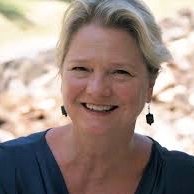
The APA Award for Distinguished Contributions to Psychology in the Public Interest recognizes persons who, in the opinion of the Committee on Psychology in the Public Interest Awards, have advanced psychology as a science and/or profession by a single extraordinary achievement or a lifetime of outstanding contributions in the public interest. Two awards are given—the first to a psychologist who has made a significant contribution to the public interest in the early stages of his or her career, and the second to a senior psychologist.
Congratulations Nancy!
Division 52 Council Rep Report
Merry Bullock, Ph.D., Division 52 Representative to APA Council of Representatives

February 2024 Council Meeting Highlights
APA’s Council of Representatives met Feb. 23-24, in person in Washington, DC and via ZOOM.
I attended in person, and was delighted to see that the Committee on Global Psychology’s Chair, Gurusewak Khalsa, was also in attendance, seated at a table with other Board and Committee chairs. This was the first meeting where a representative from APA’s global governance was invited!
Council passed a number of resolutions/items:
- Calling for an End to Involuntary Individual Isolation in Incarcerated Youth – Council passed a resolution calling for ending the placement of youths in isolation in juvenile justice settings, except for emergencies, and then only for a maximum of a 4-hour period. “Solitary confinement should never be used for punishment or disciplinary purposes, or for the protection of property,” states the resolution. “The separation of youths from others must never be a substitute for adequate staffing numbers, staff training, and supervisory and/or administrative support.” The resolution passed 154-2, with 1 abstention.
- Secure Firearms Storage – Council approved a resolution aimed at promoting secure firearm storage practices. This resolution underscores the critical role of psychologists and health care providers in preventing suicides by advocating for secure firearm storage and safety strategies.
- Policy Statement on Evidence-Based Inclusive Care for Transgender, Gender Diverse and Nonbinary Individuals – Council passed a policy statement affirming evidence-based care for transgender, gender diverse and nonbinary children, adolescents and adults. It notes that recent legislative attempts to obstruct access to psychological and medical interventions for such individuals puts them at risk of depression, anxiety and other negative mental health outcomes, and addresses how misinformation can distort the characterization of gender dysphoria and gender-affirming care, leading to stigmatization, marginalization and lack of access to psychological and medical care for this population.
- Approval of APA/APASI Strategic Plan – Council approved the APA/APASI strategic plan (which was not open to modification by Council). The new plan does promote global partnerships and engagement.
- Parents with Disabilities Recognizing the biases and challenges often encountered by parents with disabilities, Council adopted a resolution to support parents with disabilities.
- Combating Misinformation and Promoting Psychological Science Literacy – Council adopted a resolution on combating misinformation and promoting psychological science literacy. The resolution recognizes that misinformation leads to mistrust and can pose a threat to public health. It states that “to fully understand the impact of misinformation, it is necessary to understand the psychological factors that drive people to believe and share it, the levers of manipulation used by its creators, and the network effects induced by today’s media and political landscape that impact its spread.” The policy commits APA to disseminate psychological science to address misinformation and to promote psychological science literacy.
- Revised Guidelines for Psychological Practice with Older Adults – Council adopted revised Guidelines for Psychological Practice with Older Adults, with an expiration date of Dec. 31, 2034. These guidelines focus greater attention on the strengths and needs of older adults, and work to develop workforce competency in working with this population. This revision addresses the increased use of technology and telehealth for the first time.
In addition, Council approved a a $25 reduction in the dues at year four through six of the dues ramp-up ($149 to $124) and a $27 increase in the APA base member dues rate ($247 to $274).
There were also some learning experiences for council members – these included:
- An Address by Dr. Miriam Delphin-Rittman , administrator of SAMHSA, who outlined progress and attention to mental health across diverse populations, building the workforce, addressing substance use disorders and suicide prevention.
- Learning about APA and AI – representatives from most of APA’s units (legal, IT, science, education, practice, workforce, etc) gave demonstrations of how APA is using AI, and invited council members to engage.
After the Council meeting I have been continuing to meet with (and co-chair) the Council Caucus on Promoting Global and Global Human Rights Perspectives. We are currently in the writing phase of a new business resolution on APA’s and Psychology’s response to global armed conflict. The writing group consists of 6 persons, including 4 from the caucus, and representatives from Divisions 19, 39 and the APA Office of International Affairs. When a draft is ready, Division 52 members will be asked for comment.
The Caucus is also exploring how APA is implementing its 2015 Resolution on APA and Psychology and Human Rights, in particular the development of human rights education materials.
Update from the American Psychological Association’s Coalition for Psychology in Schools and Education
Patricia H. A. Perez, PhD: Adjunct Faculty, Department of Psychology, Adler University, Division 52 Representative, CPSE

The Coalition for Psychology in Schools and Education (CPSE) includes members who represent various APA divisions. I am pleased to be the Division 52 representative since December 2019. CPSE’s mission “is to bring together interested psychologists to promote and make publicly accessible applications of the research that psychology has developed to assist the nation in improving the quality of public and private pre-K to 12 education” (https://www.apa.org/ed/schools/coalition).
As a group, we meet annually in Washington, DC. Our last meeting was held from February 28-March 1.
Please see the projects I have participated in as a representative of Division 52.
Mental Health Primers-This working group was launched in 2018. These primers assist teachers with relevant research and strategies for addressing mental health issues of their students. We have started exploring collaboration with interested organizations and programs in the development of additional primers topics. https://www.apa.org/ed/schools/primer
Top 10 Principles: Family Companion-This working group was created in June 2022 to develop a report that focuses on principles that loosely follow the Top 20 Principles on PreK-12 for Teaching and Learning. The Top 10 Principles will be used as a companion report for parents, family, and caregivers in
support of their child in academic settings, within the home, and across their communities. This Companion is scheduled to be published this year.
Promoting Mental Health and Academic Success: Leveraging Lessons From the COVID-19 Pandemic- This working group was created in June 2021 to address lessons learned for teachers, family, leadership, and students during the COVID-19 pandemic. Five areas were highlighted in this report: 1) Community
Outreach, 2) Instruction, 3) Mental Health and Well-being (lead author), 4) Promoting Science-based Information, and 5) Technology. This report is scheduled to be published this year.
Educator and Student Mental Health and Well-Being (State and Federal)-At the conclusion of this group meeting, teams were created to address educator and student mental health and well-being in PreK-12 schools nationally. As the lead for Team 3, our task is to identify access, advocacy, and resources per state in order to make further recommendations on the federal level. This is an on-going project for this year.
Our next meeting is scheduled in Washington, DC from February 26-28, 2025. If you are interested in learning more about CPSE and our work, please feel free to contact me at pperez@adler.edu.
Global mental health: A population health approach for enhancing mental wellness
Djavila Ho, MSc & Carlos Zalaquett, PhD
The Global Psychology Alliance (GPA) is a body of over 70 leaders of international psychological associations under the auspices of the Office of International Affairs at the APA. The GPA International Summit on Psychology and Global Health in Bogota, Columbia, 2022, saw Alliance members discussing and affirming their commitment to addressing UN Sustainable Development Goals (SDGs) 3 (Good Health and Wellbeing), 10 (Reduced Inequality), and 13 (Climate Action). The output of these meetings was the development of a roadmap with actions for each of the three SDGs to be executed and reviewed by 2025. Fostering ongoing international collaboration, sub-groups would continue to meet over the next few years to put this road map into action.
The Global Mental Health (GMH) sub-group has since begun to address four key action items to propel the agenda for good health and wellbeing, specifically focusing on mental health. Of the four action items, the first is advocacy for the adoption of a population health framework for mental health. This population health framework would serve as a foundation for the remaining three action items of the GMH – coordinating GPA training for communication with government and policymakers, mental health stigma reduction, and improving access to community mental health through capacity building.
The GMH’s population health statement was crafted to introduce the population health framework as a complement to conventional individual mental health care model and explain how psychology fits within this perspective. It highlights how taking such an approach can ensure greater access to affordable, quality-based mental health care while enhancing existing community-based systems of care that target the well- being of individuals and communities. The GMH sub-group believes that the global psychology community must adopt a population health framework and engage in population health services to adequately meet SDG3 and promote mental health and wellbeing, prevent mental disorders, support early intervention, foster referral and recovery services, and reduce relapses.
Few countries have sought to include a population health approach for mental health care. However, psychological associations are uniquely positioned to advocate and lobby relevant government bodies and local agencies, emphasizing how this approach can augment the population’s mental health and the long-term health economic benefits of doing so.
According to the roadmap, the next step for this subgroup is guidance for action. We now endeavor to build upon this PHF statement by crafting an advocacy toolkit that will provide global examples of population-based approaches to mental health that have already been enacted and provide guidance on how psychologists can introduce this approach in their communities. Consistent with the broader work of the GPA, we aim to have a global perspective, shining light on various approaches to population health for addressing mental health. With this, we invite readers to share any population-based programs they know about or are involved in with the Global Mental Health steering committee at gmhsteeringcommittee@gmail.com.
Resources:
- Population health statement (available in other languages) – https://www.apa.org/international/networks/global-psychology-alliance/population-health-statement.pdf
- Global Psychology Alliance (GPA) – https://www.apa.org/international/networks/global-psychology-alliance

Libro PSICOLOGÍA CLÍNICA: PERSPECTIVA INTERNACIONAL (Buela-Casal, G. y Sierra, J. C., Editores).
He tenido el honor de participar en el nuevo libro publicado por nuestros colegas Gualberto Buela-Casal y Juan Carlos Sierra. El libro, publicado en formato virtual (eBook) y ofrecido en forma gratuita representa un significativo esfuerzo para ofrecer una clara perspectiva global de la psicología clínica. Lo que realza aún más el valor del libro es su cobertura internacional y su profundidad de análisis. Usando un formato de entrevistas nuestros colegas nos encamina al abordajes de temas altamente relevantes de la Psicología Clínica, los cuales son analizados por importantes profesionales de la psicología de todos los continentes, lo que sin duda supone una perspectiva global de la psicología.
Como lo señalan los editores, “participan en este libro destacades especialistas profesionales e investigadores que han publicado más de 4.000 artículos en revistas científicas indexadas en Web of Science (WoS) y que han recibido cerca de 130.000 citas. Además, doce de los autores forman parte del prestigioso ranking de científicos más influyentes del mundo elaborado por la Universidad de Stanford. Todos estos datos son indicadores de la calidad de la obra”.
Trabajando en conjunto con la Editorial Dykinson estos destacados colegas han logrado ofrecer el libro sin costo alguno, otra razón para felicitarlos por su gran logro. Este es el vinculo donde pueden descargar el libro: https://www.dykinson.com/libros/psicologia-clinica-perspectiva-internacional/9788411707534/
The book PSICOLOGÍA CLÍNICA: PERSPECTIVA INTERNACIONAL (CLINICAL PSYCHOLOGY: INTERNATIONAL PERSPECTIVE), edited by Gualberto Buela-Casal y Juan Carlos Sierra, has just been published. The book is a compilation of the interviews that were conducted with guest speakers in recent years at the International Congress of Clinical Psychology. This book focuses on important topics of Clinical Psychology. Each topic is analyzed by relevant psychologists from all continents, creating a clear global perspective. The editors worked with Dykinson publisher to produce an e-book version available free of charge. Here is the link to download the book:
> https://nam10.safelinks.protection.outlook.com/?url=https%3A%2F%2Fwww.
Espero que disfruten esta gran publicación – Hope you will enjoy this great publication.
Carlos P. Zalaquett, Ph.D., M.A., Lic.
Think Tank: “Post-colonial challenges and future directions in cultural psychology”
Postcolonial theory is a school of thought that emerged particularly after the end of the Second World War and the looming dissolution of the European colonial empires. It analyses:
- how especially European colonialism and influenced the destinies of colonized countries and their societies,
- how this far-reaching and profound influence was possible, and
- how it created global conditions that ensure the continued hegemony of the former colonial powers in economy, politics, media, and in science – long after the dissolution of the colonial empires and the so-called protectorates.
Although historical colonialism is formally over, except for minor territories, the relations between the global North and the global South are still fundamentally shaped by a shared past and new patterns of colonization. In the sciences, persistent asymmetrical structures have been created – not necessarily based on better scientific arguments, but especially through raw power-political enforcement. To this day, Euro-North American knowledge systems are still regarded unquestioningly as “world standards”, as can be seen, for example, in the calendar, time calculation, time zones, geographical divisions, names and images of the continents, physical units and designations, English as a lingua franca, concepts of modernity, ideas of progress, etc.
Western, i.e. North American and European thinkers and their theories, European history and interpretation of history, European academic media with their views on current events still dominate the international knowledge agenda today. This colonialist-based situation is supported by the power of academic publishing houses and journals whose boards continue to be dominated by representatives of the former colonial powers.
Cultural psychology, which since its beginnings has made it its task to enrich laboratory findings with findings from the natural ecology of human beings and to do justice to human subjects not only as natural beings, but also as socio-historical, biographical, and linguistic cultural beings, should not be blind to these contexts in which its own history and characteristics also operate. This meeting will therefore be dedicated to raising awareness of the far-reaching significance of this topic, illustrating it using examples from the psychological and social sciences and reflecting on the necessary consequences. The workshop will take the form of a “think-tank” activity, that is an informal and equalitarian discussion led only by intellectual curiosity and critical reflexivity.
The international workshop is funded by ReNEW-Reimagining Norden in an Evolving World: An Excellence Hub in Research, Education and Public Outreach – and by Challenges of Sustainability in Educational Research (COSER).
Robots Revolutionize Learning: Special Education Soars with AI Companions
Mohammad Tahan, PhD
In a ground-breaking development, educational robotics is transforming the landscape of special education, offering exceptional children a gateway to personalized learning, enhanced engagement, and social-emotional growth. This isn’t science fiction; it’s the exciting reality unfolding in classrooms across the globe, where robots are becoming more than just machines – they’re becoming supportive companions and catalysts for progress (Tahan et al., 2024).
Unlocking Potential, One Interaction at a Time
Imagine a child with autism spectrum disorder (ASD) struggling with communication. Now, picture them interacting with a robot designed to understand and respond to their unique needs. This is the power of educational robotics. These robots, programmed with social cues and emotional intelligence, create a safe space for children to practice communication skills, build confidence, and express themselves freely pandemic (Tahan et al., 2023; 2024).
A Spectrum of Benefits
The impact extends far beyond communication. Robots can be programmed to cater to individual learning styles and paces, offering personalized instruction in math, science, and even social-emotional learning. Children with physical disabilities can control robots through voice commands or assistive technology, fostering independence and participation. Studies have shown significant improvements in focus, problem-solving, and critical thinking skills in students using educational robotics (Tahan, 2019; 2023).
More than Just Technology
A Human Connection: The most remarkable aspect of this revolution is the human connection forged between children and robots. These interactive companions provide a non-judgmental space for learning and exploration, reducing anxiety and promoting social interaction. For children with social challenges, robots can act as stepping stones to building relationships with peers (Tahan & Saleem, 2023).
The Future is now
While the field is still evolving, the potential of educational robotics is undeniable. As technology advances and costs decrease, accessibility is increasing, making this transformative tool available to more exceptional children. Imagine classrooms where robots seamlessly integrate into the learning environment, tailoring instruction and fostering growth for every student. This is the future of special education, and it’s happening now.
This is just the beginning of the story. As researchers and educators continue to explore the possibilities of educational robotics, the impact on special education promises to be even more profound. The future is bright, and it’s filled with robots that are not just machines, but partners in learning, empowering exceptional children to reach their full potential.
References
Tahan, M., Afrooz, G., & Bolhari, J. (2024). Training of a robot-based psychological intervention program to prevent inappropriate touching of children. Middle East Current Psychiatry, 31(1), 12. https://doi.org/10.1186/s43045-024-00404-x
Tahan, M., Afrooz, G.A., & Bolhari, J. (2024). Training and evaluation of robot-based psychological intervention program for preventing child sexual abuse. Child Protection and Practice, 100030, https://doi.org/10.1016/j.chipro.2024.100030
Tahan, M., Afrooz, G., & Bolhari, J. (2023). Designing, assessing, and effectiveness a psychological interventions program with a robot for children sexual care. Middle East Current Psychiatry, 30(1), 73. https://doi.org/10.1186/s43045023003479
Tahan, M., & Saleem, T. (2023). Application of artificial intelligence for diagnosis, prognosis and treatment in psychology: A review. Neuropsychiatria i Neuropsychologia/Neuropsychiatry and Neuropsychology, 18(1), 36–45. https://doi.org /10.5114/nan.2023.129070
Tahan, M. (2023). Robot-based psychological intervention program for the prevention of child sexual abuse: An overview. Neuropsychopharmacol Hung, 25(1), 18–25
Tahan, M., & Zygoulis, F. (2020). Artificial intelligence and clinical psychology – Current trends. Journal of Clinical and Developmental Psychology, 2(1), 31–48. https://doi.org/10.6092/2612-4033/0110-2184
Tahan, M. (2019). Artificial Intelligence applications and psychology: An overview. Neuropsychopharmacol Hung, Sep;21(3):119-126. PMID, 31537752.
Is the Concept of Peace still Relevant in this Age of Political Polarization and Violent Aggression? *
Naji Abi-Hashem, PhD
Associate with Member Care International & Non-Resident Scholar at Baylor University’s Institute for Studies of Religion (ISR): An Interdisciplinary Research Center.
The concept of “peace” is very fascinating and intriguing. It is a very old and rich concept and has always been held in high regards as a precious human virtue. Ancient wisdom tells us that peace portrays a state of well-being and equilibrium on personal, familial, communal, social, and national levels. At the same time, it does not imply a total absence of hardship, adversity, strife, or conflict. Rather, peace mainly reflects inner-calm, interpersonal confidence, and intra-group tranquility, in spite of any prevalent dilemmas and troubles.
Through the years, I have tried to compile the spelling of “peace” in various languages, so to manifest its broad linguistic dimension and cultural heritage. For example, Irene-Greek, Shalom-Hebrew, Salaam–Arabic, Paix–French, Pardamean–Ethiopian, Shanti–Indian Hindi, Emirembe–Uganda, Khotso–South African, Amani–Swahili, Vrede–Dutch, Potawatomi–Native American, Khanaghutyun–Armenian, etc. These words are very resounding when read out loud!
Virtually, peace draws from a combination of internal psycho-spiritual faculties/energies and external socio-cultural mediators/qualities. It equally promotes individual wellbeing and integrates communal welfare. Historically, people used to enter relationships and assume social roles (like leadership, marriage, practicing trades, etc.), while taking upon themselves–first and foremost, the high-task and responsibility to serve the family and community before meeting their personal needs or achieving their individual privacy, boundary, or prestige. Respecting the elderly, maintaining group harmony, and increasing the nurture and comfort of the community are still high social values and priorities in many parts of the world today.
Originally, the concept of Shalom in Hebrew, Eirene in Greek, and Salaam in Arabic meant a healthy functioning, a state of holistic life, a full blessing upon the group, a tranquility of mind-body-heart-soul, and a total wellbeing for the whole tribe or community. Thus, peace promoted a major transcendence over many negative human tendencies, like control, greed, and mistreatment, and the instinctual drives for creating tensions/divisions, or acting from pure selfish motives and aggression.
Presently, there are so many labels for peace and an equivalent number of interpretations, connotations, understandings, and expectations. In the process of conceptualizing peace, or what does it really mean to be peaceful or peaceable, most people, groups, agencies, and governments rely heavily on their own narrow perspective, background experience, social norms, political orientation, cultural heritage, philosophical ideology, religious mindset/values, and limited worldview. These factors can certainly mobilize and unify the people involved together or can significantly separate, divide, and alienate them from each other.
The concept of peace is fluid and dynamic, not static, rigid, or frozen in time. That is similar to the concept of truth or the notion of reality. However, peace is not merely an intellectual property or a theoretical abstract, but rather an experiential energy and a vital force for settlement, stability, soothing, and solidarity. It is an amazing agent for positive change and social harmony. These faculties and mediators will eventually lead toward growth and prosperity, if applied properly, with a clear objective and genuine intention or unbiased motive.
In recent decades, especially during the last few years, the world has seen a substantial increase in fundamentalism, extremism, fanaticism, and radicalism. That phenomenon is not happening only in religious circles, but also in all other segments of society and subcultures (like, politics, economics, academics, ethics…). People are flocking into opposite camps and embracing sharp mentalities/polarities that seem to have no room for a middle ground, usual ambiguity, realistic negotiation, mutual understanding, or elementary- basic appreciation of the “other.”
Minds are becoming completely “strict, “skewed,” and “locked.” The only openness or possible engagement with the other camp appears to happen only for the sake of discrediting, demonizing, or even defeating-eliminating the other. Opposing groups and nations seem to resort to military force and lethal power, so quickly and impulsively, in order to resolve their major disputes, contradictory views, and cumulative conflicts. Each party wants to impose their own “version of peace,” mostly based on their pure interest, intellectual advantage, and geo-political dominance.
So, what happened to the precious concept of accord and the traditional movement of peace? Unfortunately, they have been used, misused, abused, confused, diverted, manipulated, fragmented, overly diagnosed, majorly altered, distorted, and intentionally polarized.
Obviously, waging wars is much easier than waging peace, both on the micro and macro levels! Some militant groups and war-minded nations want to destroy, kill, and bomb their way into resolution and peace! Non-violence/mediation movements and pacificism are becoming outmoded/out-of-fashion and somehow being replaced by the slogan “only might makes things right!” Those who have the upper-hand and function merely from potent authoritarianism, will dictate what is peace or peaceable-living and what is not!
Did the gentle value and the foundational virtue of peace lose its soul? How can the people-helpers, like educators, counselors, public servants, community leaders, social workers, clergy/pastors, and general caregivers, become more involved? How can they be more effective and leave a long-lasting impact? Gratefully, many community agencies are bravely doing their part. In addition, several academic institutions around the world are designing and offering solid graduate degrees in Peace Studies.
Thus, good-will people are not giving up! Plenty of active groups, specialized teams, and sincere individuals are making great contributions, everywhere, even on a small scale, in form of volunteering, bridge-building, cross-cultural-humanitarian work, peacemaking, reconciliation, and international service (e.g., peace-psychologists). They are mobilizing the positive human spirit, capitalizing on the goodness inherent in each person/group, promoting the cultural richness and generational wisdom available in every traditional community and country—all of which are greatly enhancing our human commonality, harmony, solidarity, resiliency, and maturity.
So, let us press on and keep up the good work — for together we can make a significant difference.
* This article is based upon several presentations made on the topic at local and global professional meetings, including APA.
How can psychologists promote human rights?
Maryam N. Tafreshi & Harold Takooshian
On February 29, 2024, this question was the focus of a webinar which brought together APA Division 52 and the Psychology Coalition at the United Nations (PCUN).
This webinar was organized by Maryam N. Tafreshi of Saybrook University, the co-Chair of the Division 52 Human Rights Committee. It was moderated by Emma Grace, Professor at the Chicago School (TCSPP), and featured five experts.
Maryam Tafreshi spoke about “The Cyrus Cylinder, and origins of the first charter for human rights” in Persia around 500 years BC.
Michael Stevens of Illinois State University offered a data-based overview on “Global democracy, human rights, and community solidarity.”
Tara Pir, the CEO of the Institute for Multicultural Counseling and Education Services (IMCES), addressed “Why sustainable peace and human rights have not been achievable: What can be done?”
Harold Takooshian of Fordham University shared the “IMCES resolution about oppressed psychologists,” which is posted online after being endorsed by most PCUN member organizations.
Breeda McGrath of the Chicago School served as the discussant.
Ahmed Gulzar–Chair of the Division 52 Committee on Human Rights, Peace, and Global Well-Being–also shared his views on the importance of human rights in the psychology agenda.
Division 52 webmaster Luca Tateo recorded this webinar to post online.

Reflections on Psychology Day at the United Nations April 25, 2024
Elaine H. Olaoye, Ph.D.
Psychology Day at the United Nations 2024, was thoughtfully and strategically researched and complemented by some imaginative decisions made by Dr. Kim Baranowski and Dr. Carolina Corrales, Chair and Co Chair, it was indeed a resounding success. I trust it will reverberate around the world all year, inspiring new collaborations that increase effective contributions to dealing with the epidemic of mental health problems that seem to happening around the globe.
The presentations not only covered research or treatment related to, or based on, tens of thousands of of adults and children, across at least four continents, from seventy-five countries, with populations struggling mightily with mental health and behavioral issues, but presentations also struck some emotional and cultural high notes, resulting in many synergic, energized and inspirational moments! Attendees were nodding their heads and placing affirmative comments in the chat.
Although the focus was on education, many presentations’ foci shone lights on the growing need for inclusion of artistic endeavor, lived experiences and cultural practices, in bringing meaningful and more readily accessible techniques, to educational and therapeutic practices. The critical issues of relationship as well as research, were juxtaposed and shown to work together in a clearer than usual manner, that could lead to increased adoption of some of these approaches. Similar approaches were recognized in Psychology with the establishment of Division 10 ‘Psychology and the Arts’ as a charter division of APA as early as 1945. Fowler, 1998 wrote: “It is common knowledge that psychology is both an art and a science. The depth of human experience is best addressed by drawing from the humanities and the sciences”.
As the Main Representative of the International Council of Psychologists (ICP) I am pleased to note that one of the ICP interns, Manisha Kumari convened a Psychology Day Watch Party in India at O.P. Jindal Global University. There were watch parties in Rochester, Geneva, Los Angeles and New York as well. I also sent out announcements of Psychology Day 2024 to all 193 Member states at the UN. In general publicity resulted in more than 800 participants and over 1700 registrants. We are looking forward to setting up some Psychology Day at the UN discussions and talk backs.
 Psychology Watch Party in India, April 25, 2024, O.P. Jindal Global University
Psychology Watch Party in India, April 25, 2024, O.P. Jindal Global University
A series of four publications on International Psychology Behavioral Science in the Global Arena, spearheaded by editors Elaine P. Congress, Harold Takooshian, and several guest faculty and student editors, deserve attention here. The editor of the fourth volume, titled Children Around the World (2024) was one of the Psychology Day 2024, outstanding presenters, Niels Peter Rygaard, CEO and Co-founder of the Danish Fairstart Foundation. Dr. Rygaard emphasized over and over again the importance of respecting and incorporating cultural knowledge and practices in helping children and their caregivers in the many countries he worked in around the world.
In collaboration with the legendary Philip Zimbardo, I wrote a chapter for Volume 2,”Global, Spiritual and Social Health”. (2022) I wrote “ Zimbardo’s choice of two key words – hero and imagination- come from vocabularies outside of the narrow domain of scientific psychology. Together these concepts embrace literature, myth, philosophy and more.” Dr. Zimbardo’s work conceptualized in his training of ‘Everyday heroes’ applies social psychological experimental results and more. The training also promotes the development of critical social relationships while applying evidenced based principles.
As an individual in whom psychology and poetry have lived, grown and struggled for decades in my brain, it has resulted in a quality of cognitive and emotional stimulation that I have found valuable. It has also contributed in significant ways to my mental health and well being, Teaching undergraduate statistics in Psychology and writing poetry provided interesting and important tensions that invited resolutions. I was indeed delighted by the presence of both in the Psychology Day presentations.
I am currently taking a break from teaching psychology and working instead on publishing poetic works: I am completing a republication of a volume titled “Passions of the Soul” (2024) that covers nine sets of passions including Passions of a Poet, Passions of Friendship, Passions of Love, Passions of the Future, Passions of the Seasons, and Passions of the Soul, covering works from 1967 -2023. Some of these poems are then used in the Appendix, titled “Recipes for feeding the Soul’ where they help create therapeutic zero calorie recipes. For example, ‘Rosemaried chicken and tossed time’ is designed to help cope with largely environmentally induced stress and anxiety. The recipes utilize the metaphors of cooking and eating, as well as specific poems in the volume, to guide engagement in self reflection and a self therapeutic practice. The volume will be available shortly.
I am also working on poetry volume entitled “45 Years of Gratitude: An academic’s memoir”. A collections of tributes and memories covering decades of events, teaching and learning experiences, and relationships, while becoming and being a professor of psychology. Gratitude a concept long recognized in the wisdom literature, has been the focus of much attention and research in Positive Psychology.
Despite the widespread acknowledgement of mental health problems, it is important to recognize that these are not all psychopathological problems, they include problems in living, problems coping with stressors from the environment, from the speed of modern change, from urbanization, etc. These can be short term and long term as well as individual or social, and its important for mental health workers to distinguish among these levels of responding and recognize interventions that focus on manageable self analysis and practice. This can increase a sense of agency, while calling upon individuals’ and cultural strengths, that too often get eclipsed or go unnoticed. Treasured poems and timeless poets, as well as cultural wisdoms that have supported generations, can be called upon at appropriate times, to help individuals and groups to respond to a variety of potentially overwhelming challenges, in ways, that prevent them from developing into larger and more pervasive conditions.
Identifications of relationships between poetry and psychology were made by Freud and many other luminaries in psychology, based on the emotional and cognitive properties that are part of poetry. Additionally, poetry has been around for millennia and has guided and helped heal humanity in culture after culture and in era after era. My applause for 2024 Psychology Day’s format may be seen by some, as influenced by my current and chosen concentration. But where psychology can be efficiently supplemented, not reduced or replaced, by pairing the emotional with the cognitive, the individual approach with a social one, and future oriented, cold research with more immediately oriented, warm relationships, describe a bias that I am confessing to here, this is not only professionally propelled but also heartfelt.
Bravo to the Chair and Co-Chair of Psychology Day at the United Nations! Initiated for 17 years by the Psychology Coalition at the UN (PCUN), a concerted effort of many psychology NGOS working at the United Nations and sponsored this year by the UN missions from South Africa and the Philippines. Thanks to all.
References
Fowler, R.D. The healing arts, APA Monitor 29 (March), 3 1998.
Olaoye, Elaine H., Zimbardo, Philip G. and Zsuzsanna M. Feher, Behavioral Science in the Global Arena: Global, Mental, Spiritual and Social Health¸ Promoting Prosocial Behavior through “everyday heroism”. Pages 167-179. Information Age Publishing 2022
Psychology Coalition at the United Nations: Continued expansion
Harold Takooshian & David Livert
In 2025, the United Nations celebrates the 80th anniversary of its birth on June 26, 1945. This three-part report recounts recent activities in early 2024 to describe the unlikely yet continued growth of psychology at the UN, despite challenges.
PCUN membership. Since the Psychology Coalition at the UN (PCUN) was formed in 2012, it has met monthly in New York City, at or near the UN building. These are about 20-40 representatives and interns in about 10 psychology NGOs, primarily living or working in the New York area. With the advent of global COVID-19 lock-downs starting in March of 2020, the monthly meetings were replaced by online zoom meetings that facilitated the participation of non-New York colleagues and students from many nations. This includes a new PCUN Secretary Efrat Neter (Israel) and Vice President Vera Araújo-Soares (Netherlands/ Germany) (Takooshian & Congress, 2022). Since 2020, PCUN continued to thrive under its officers, including Presidents Leslie Popoff (2019-2021), David Marcotte (2021-2022), and David Livert (2022-2024).
On March 27, 2024, PCUN representatives voted unanimously to add a new NGO #11 to membership in PCUN. (See Table 1.) The Society for Personality and Social Psychology (www.spsp.org) began as Division 8 of the American Psychological Association. Since SPSP incorporated in 1974, SPSP has grown into 7,500 colleagues and students across many nations. The SPSP team at the UN is headed by Rakoen Martens (University of Oxford, UK) and Friedrich Götz (University of British Columbia, Canada).
PCUN book series. In December of 2020, during the COVID lock-down, PCUN voted unanimously to launch a new International Psychology book series, in partnership with legendary fifth-generation publisher George F. Johnson of Information Age Publishing. The book series has many goals including these: (1) To provide a platform to share psychology expertise on global issues with the UN and the public. (2) To pair busy experts with talented student interns, to co-author authoritative and readable chapters. (3) To provide useful and inexpensive textbooks for college courses.
In March of 2024, volume 5 appeared: a 16-chapter volume on “Children around the world” with four editors: Niels Rygaard, Uwe P. Gielen, Elaine P. Congress, and Julia Larock. This tome’s 16 chapters brought together 32 co-authors from 9 nations and several disciplines (including psychology, social work, medicine, law, education)—suitable for diverse courses in psychology, social work, and education. PCUN has also launched a new series of concise “gray papers” to post on timely global issues.
Psychology Day at the UN. PCUN scheduled its 17th annual Psychology Day for April 25, 2024. Under a team headed by Kim Baranowski of Mount Sinai School of Medicine, the focus of the 2024 webinar is “Reducing global inequalities through education: Psychological contributions,” featuring five speakers from five nations. (See www.psychologydayun.com/ ) In recent years, these Psychology Day webinars have reached up to 2,000 registrants in over 100 nations (Comerchero & Takooshian, 2023).
Starting in 2024, PCUN is hosting “watch parties” on April 25 in four cities, headed by local representatives: (a) Geneva with Kelly and Michèle O’Donnell, (b) Los Angeles with Peyman Raoofi, (c) New York City with Harold Takooshian, (d) Rochester NY with Katlyn Rice.
In recent years the UN has become visibly more receptive to behavioral science input. As the UN prepares for its 80th anniversary in 2025, PCUN continues to seek innovative ways to advance the UN agenda.
Table 1. 21 UN Psychology NGOs in 2024 (11* in PCUN)
Organization |
Formed | NGO | Website |
| *IUPsyS: International Union of Psychological Sciences | 1889/1951 | 1998 | www.iupsys.org |
| *APA: American Psychological Association | 1892 | 1999 | www.apa.org |
| IPA: International Psychoanalytic Association Trust | 1910 | 1998 | www.ipa.org.uk |
| *IAAP: International Association of Applied Psychology | 1920 | 2003 | www.iaapsy.org |
| IAQ: International Orthopsychiatric Association | 1924 | 1999 | www.amerortho.org |
| *SPSSI: Society for Psychological Study of Social Issues | 1936 | 1991 | www.spssi.org |
| *ICP: International Council of Psychologists | 1941 | 1981 | www.icpweb.org |
| *SIOP: Society for Industrial-Organizational Psychology | 1945 | 2011 | www.siop.org |
| WAWI: William Alanson White Institute | 1946 | www.wawhite.org | |
| WFMH: World Federation for Mental Health | 1948 | 1963 | www.wfmh.org |
| AWP: Association for Women in Psychology | 1969 | 1976 | www.awpsych.org |
| *SPSP: Society for Personality & Social Psychology | 1974 | 2023 | https://spsp.org/ |
| IOA: International Ontopsychology Association | 1978 | 1999 | www.ontopsicologia.org |
| ISPA: International School Psychology Association | 1982 | 2004 | www.ispaweb.org |
| ISTSS: International Society for Traumatic Stress Studies | 1985 | 1993 | www.istss.org |
| *EHPS: European Health Psychology Society | 1986 | 2015 | www.ehps.net |
| IFTA: International Family Therapy Association | 1987 | 1999 | www.ifta-familytherapy.org |
| *IMCES: Institute for Multicultural Counseling & Education Services | 1989 | 2010 | www.imces.org |
| *ATOP: Association for Trauma Outreach & Prevention | 1990 | 2009 | www.meaningfulworld.com |
| *WCP: World Council for Psychotherapy | 1995 | 2003 | www.worldpsyche.org |
| PsiSIP: Psychology of Science in Policy | 2014 | 2018 | www.psysip.org |
References
Comerchero, V, & Takooshian, H. (2023, Spring). UN Psychology Day 2023 focused on the promotion of peace. International Psychology Bulletin, 27 (2), 26-28.
Rygaard, N.P., Gielen, U.P., Congress, E.P., & Larock, J. (2024). (Eds.). Children around the world: The future of our earth. Information Age Publishing. https://www.infoagepub.com/products/Children-Around-the-World
Takooshian, H., & Congress, E.P. (2022, Summer). Expanding psychology at the United Nations. International Union of Psychological Sciences Bulletin, 14 (2), 5-6. www.iupsys.net/wp-content/uploads/2022/07/IUPsyS-Bulletin-Volume-14-Number-02.pdf
BOOK REVIEW
Pandemic Providers: Psychologists Respond to Covid
Danny Wedding, PhD, MPH
On March 11, 2020, a pandemic was declared by the World Health Organization; this declaration came after 118,000 cases of the virus were diagnosed in 114 countries, resulting in 4,291 deaths. As of March 23, 2024, 774,834,237 cases had been confirmed worldwide in 229 countries and territories, resulting in more than seven million confirmed deaths (approximately 1.2 million in the US) (Worldometer, n.d.). These numbers increase daily. Although Joe Biden declared on May 11, 2023 that the national state of emergency for COVID was over, the disease continues to be a global threat that bedevils public health officials around the world.
None of us were ready for the COVID pandemic, and few of us were able to anticipate the profound changes that would result from an infection with a virus that was previously unknown to almost everyone, including psychologists. However, we soon confronted new challenges: Our patients were reluctant to come to our offices, fearing infection; when they did come, they wore masks, making it difficult to hear them clearly or assess affect; comfortable and seemingly innocuous acts like simply shaking hands became threatening and uncomfortable; cancelled appointments were commonplace as the virus spread; and conferencing with patients with Zoom became the new norm – and eventually a widely accepted professional interaction that received federal funding (Watson et al., 2023).
While many of us reacted by withdrawing from professional practice, a group of psychologists, experts in treating trauma and members of the American Psychological Association’s Division of Trauma Psychology (Division 56), began meeting weekly online to share insights and experiences with the challenges presented by the pandemic. These weekly meetings eventually resulted in an edited book, Pandemic Providers: Psychologists Respond to Covid, published by Springer. The three editors, Charles Figley, Lenore Walker and Ilene Serlin, are well known psychologists widely recognized for their trauma expertise. They were able to recruit an astonishingly talented range of contributors, many of whom will be well known to International Psychology Bulletin readers. These contributors include luminaries such as Judith Alpert, Maureen O’Reilly-Landry, Judy Kuriansky, Patricia O’Gorman, Kirk Schneider, and Arlene Steinberg.
Pandemic Providers is a unique book, just as the COVID pandemic was a unique public health challenge. The APA task force was “bottom up,” unlike other association task force groups that typically are implemented by APA Council. Fourteen APA specialty divisions participated in the work, led by psychologist Charles Figley. The group met on a weekly basis, sharing experiences and letting one another know what seemed to work in treating the depression and anxiety that accompanied the pandemic for so many.
Although the work started as an APA Task Force, it soon morphed into something more. In the Preface, the editors note:
We met weekly at noon Fridays. We quickly discovered that our group was among very few behaving collectively as practitioners to help practitioners. We were psychologists, social workers, counselors, lawyers, nurses, and other mental health specialists and experts who quickly became active in healing the nation and the world, in our own way. Although we came together under the APA rubric initially, we were on our own mission as a Task Force. Like the pandemic, the mission was emerging gradually. (p. v)
Members of Division 52 (International Psychology) will be interested in the “International and Multidimensional Perspectives on the Impact of COVID-19” chapter that examined COVID programs and policies across dozens of countries ranging from Afghanistan to Zimbabwe. In addition, there is a table in the same chapter that lists multinational research projects on the pandemic, and a separate chapter that addresses international student collaborations on COVID-19.
I was especially fascinated by a chapter by Alpert, Steinberg and Laddis comparing the COVID-19 pandemic with the 1918 influenza pandemic, also known as the “forgotten flu.” This is the closest parallel to the COVID pandemic; it “infected about one-third of the world population (500 million people) and killed 675,000 Americans and 50 million people worldwide” (p. 21). There are fascinating parallels between the attempts of Presidents Wilson and Trump to minimize the seriousness of each pandemic for political reasons.
Pandemic Providers’ extraordinary scholarship and hundreds of references and hyperlinks will be invaluable for serious COVID scholars. The book is expensive ($180 for the hardcover version; $139 for the ebook); however, the book belongs in every college and university library in English speaking countries.
In short, Pandemic Providers: Psychologists Respond to Covid is a prodigious achievement with elaborate documentation. The citations and references are comprehensive and current, and the writing is clear. The authors include many of the leading figures in contemporary psychology. This project was a Herculean task that took approximately three years to complete. Who could have guessed that a book this important would eventually result from a simple series of Friday afternoon Zoom calls? Perhaps Pandemic Providers will help guide us as psychologists and other health care providers prepare to confront the next pandemic.
References
Watson, J. D., Pierce, B. S., Tyler, C. M., Donovan, E. K., Merced, K., Mallon, M., Autler, A., & Perrin, P. B. (2023). Barriers and facilitators to psychologists’ telepsychology uptake during the beginning of the COVID-19 pandemic. International Journal of Environmental Research and Public Health, 20(8), 5467 – 5485. https://doi.org/10.3390/ijerph20085467
Worldometer (n.d.). Coronavirus cases and deaths. Retrieved March 23, 2024 from https://www.worldometers.info/coronavirus/.
As students in the field of International Psychology, we are part of a dynamic and ever-evolving discipline that holds the potential to effect meaningful global change. Our division’s focus on understanding and addressing psychological issues across different cultures and nations places us at the forefront of efforts to promote mental health, human rights, and social justice worldwide.
Being a student in this field comes with its unique set of challenges and opportunities. We are tasked with the responsibility of broadening our perspectives, deepening our cultural competence, and developing innovative approaches to tackle complex global issues. This journey, while demanding, is incredibly rewarding and transformative.
Our student committee has been working hard to achieve these objectives. So far in this current year, we have had some significant achievements. During the Mid-Winter meeting, the board voted to kickstart a mentoring program for graduate students and early career psychologists to gain guidance from more advanced members of the division. The student committee has been tasked with working on logistics for this program and reaching out to potential mentors. The student committee has been working on forging relationships with other international psychology organizations in order to better address world issues. The current student chair was fortunate to serve on a panel with other student leaders at the ESOSOC Youth Forum addressing “Youth Initiatives Driving Psychological Solutions for Sustainable Development Goals by 2030.” Through this, we were able to make better relationships between Division 52 and other organizations including The European Federation of Psychology Students’ Associations (EFPSA), International Association of Applied Psychology (IAAP), and APA division 48. We hope to have more successful partnerships in the future. Planning for the APA Convention at Seattle has begun, with discussions about programming with the ECP committee and Division 48 (Peace Psychology).
The student committee is excited for the rest of the year. We encourage students to embrace the learning opportunities, connect with your peers and mentors, and contribute your unique voice to our global community. Together, we can advance the field of International Psychology and make a positive difference in the world.
Neha Srinivas, Division 52 Student Chair 2024
nehasrinivas16@gmail.com
Olivia Mounet, Division 52 Student Chair Elect
omounet@fielding.edu

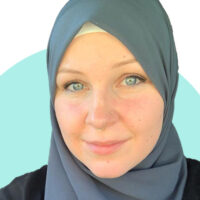
Update from the International Committee for Women
Anna Rae, PhD, Chair

The committee is several decades old, and is comprised of students, early career psychologists, and psychologists who work in a variety of sectors, all of which make an impact for the individuals and systems they serve in. New members are welcome (see below for how to join).
As the world continually changes and seeks to redefine itself, while concurrently every culture seeks recognition, women play an important role. They have a profound impact on creating sustainable systems to support health and welfare in communities. As ever, continual work is needed to help support women across the world; the Division 52 International Committee for Women (ICFW) does this.
The ICFW held its first quarterly meeting of the year on March 29. The goals for the committee for this year are to continue working on the special publication of the division 52 journal highlighting global reproductive justice, launch a webinar series, and create activities that support integrating international women’s psychology into collegiate education. This year, several ICFW members will be speaking at the APA convention as well.
Sharing the science-based work the committee members do supports the United Nations sustainable development goals of gender equality directly, and indirectly supports several other sustainable development goals such as reducing poverty and hunger, and increasing health and wellbeing.
Please join us in this incredible and important work and help us advocate for women across the world. New members are welcome; to join, you must be a member of division 52, and express interest by signing up for the list serve. To sign up for the list serve please go to https://div52.net/about/division-52-listservs/
International Environmental Justice Committee
The International Environmental Justice Committee has a new student member. Alisson Cohen joined the committee in January 2024.

Allison Cohen, B.A. (she/her) is a doctoral student in Counseling Psychology at the University of Utah and a passionate environmentalist. Her research interests and clinical work include exploring the intersections of climate change and psychosocial suffering through a multicultural lens. Her prior academic expertise lies in International Affairs and Global Environmental Health, and she is eager to incorporate these areas into her work as a Counseling Psychologist.
International Perspectives in Psychology: Research, Practice and Consultation
Ines Meyer, School of Management Studies, University of Cape Town, South Africa
Mendiola (Joy)Teng-Calleja, Ateneo de Manila University, Quezon City, Philippines
Current Issue:
Volume 13, Issue 2: 2024 https://econtent.hogrefe.com/toc/ipp/current
Author Feature
 Dr Lora Adair (lora.adair@brunel.ac.uk)
Dr Lora Adair (lora.adair@brunel.ac.uk)
Adair, L., Lozano, N., & Ferenczi, N. (in press). Abortion attitudes across cultural contexts: Exploring the role of gender inequality, abortion policy, and individual values [Special issue]. International Perspectives in Psychology: Research, Practice, and Consultation.
Summary and discussion:
In this article, we explore between- and within-country variability in abortion attitudes. Across survey respondents from Mexico, India, the USA, and the UK, we find that people living in countries with greater gender inequality and more restrictive abortion legislation reported less supportive abortion attitudes and stronger support for banning abortion. We also find that people who endorsed more traditional gender role ideologies, who reported belief in “big”/moralizing gods, and who used long-term sexual strategies reported less supportive abortion attitudes and stronger support for banning abortion. Exploratory analyses highlight how these relationships vary as a function of cultural context. For example, while people with long-term sexual strategies (e.g., preferring sex to occur in the context of a committed relationship) reported less supportive abortion attitudes in Mexico, the USA, and India, this relationship was not found among participants in the UK. We also find that those who believe in “big”/moralizing gods (e.g., gods that punish wicked people) reported less supportive abortion attitudes in Mexico and the USA (highly religious, monotheistic contexts) but not in India (contextualised by religious practices with both monotheistic and polytheistic elements) or in the UK (increasingly secular context).
Abortion attitudes matter: disapproving and judgmental attitudes towards abortion may create barriers to accessing needed abortion care as well as ostracism and stigma towards those receiving abortion care. Our findings, across the USA, the UK, India, and Mexico, demonstrate that achievement of gender equality (United Nations’ SDG #5) and promoting well-being and healthy lives for all at all ages (SDG #3) will depend on addressing both individual beliefs (i.e., beliefs about supernatural punishment, attitudes about people’s roles in society as a function of their gender, and attitudes about casual sex) and institutional structures (i.e., gender inequality and abortion legislation) that stand against safe and accessible abortion care for all.
Contributed by:
Dr Lora Adair is a Senior Lecturer in Psychology at Brunel University London and leads the Gender, Sexuality, and Relationships theme in the Centre for Culture & Evolution (CCE). Adair uses feminist evolutionary approaches, and community-engaged methods, to explore how romantic, sexual, and reproductive experiences are shaped by social forces.
* The opinions, information, opportunities, and materials expressed in this member-dedicated section are not necessarily supported by Division 52. Publication in this section does not constitute agreement or support from the Division.
Participate in Psi Chi’s Cross-Cultural, Open Science, Research Initiative!
Hello everyone,
Learn about Psi Chi’s Network for International Collaborative Exchange (NICE) and
opportunities to become involved. Research experiences offered range from annual
collaborative projects to an in-person conference this November. This project is open
to faculty and students globally, and Psi Chi membership is not required to collect
data and contribute to the crowd-sourced data pool.
Spanish:
Participa en a investigación científica transcultural de Psi Chi
Hola a todos,
Los invitamos a conocer sobre la Red Internacional de Intercambio Colaborativo
(Siglas en inglés NICE) de Psi Chi y las oportunidades para que hagas parte de
nosotros. Las experiencias de investigación ofrecen un amplio rango de opciones,
desde proyectos anuales colaborativos hasta la asistencia al próximo congreso de
Noviembre. Este proyecto es para profesores y estudiantes a nivel global. Ser
miembro de Psi Chi no es un requisito para conseguir información y contribuir en la
investigación
Greek:
Συμμετέχετε στη Διαπολιτισμική, Ερευνητική Πρωτοβουλία Ανοιχτής
Επιστήμης του Psi Chi!
Γεια σε όλους,
Μάθετε για το Δίκτυο του Psi Chi για τη Διεθνή Συνεργατική Ανταλλαγή (NICE) και
ευκαιρίες να συμμετάσχετε. Οι προσφερόμενες ερευνητικές εμπειρίες κυμαίνονται
από συμμετοχή σε ετήσια ερευνητικά έργα, έως ένα δια ζώσης συνέδριο αυτόν τον
Νοέμβριο.
Το NICE είναι ανοιχτό σε διδάσκοντες/σκούσες και φοιτητές/τριες παγκοσμίως και η
συμμετοχή στο Psi Chi δεν απαιτείται για τη συλλογή δεδομένων και την ένταξη στο
δίκτυο των ερευνητών.
Chinese:
参与 Psi Chi 的跨文化、开放科学研究计划!
大家好,
了解 Psi Chi 国际合作交流网络 (NICE) 以及参与的机会。 提供的研究经验范围 从每年的合作项目到今年11月的面对面会议。该项目面向全球的教师和学生开 放,收集数据并为众包数据池做出贡献并不需要 Psi Chi 的会员资格。
Click link for Psi Chi NICE Crowd Annual Newsletter – Psi Chi, The International Honor Society in Psychology
Conferences and Workshops
IX Regional Congress of the Inter American Psychological Society (SIP), June 25-28,
Arequipa, Perú https://regionalsip2024.com
Global Neuropsychology Congress, July 3-5, Port, Portugal
https://www.globalneuropsychology.org
38th Annual Conference of the European Health Psychology Society
September 3-6, Cascais, Portugal, https://2024.ehps.net
International Society of Political Psychology, July 4-7, 2024, Santiago, Chile https://ispp.org/meetings/
11th European Conference on Positive Psychology, July 10-13, 2024, Innsbruck, Austria. https://www.ecpp2024.com/
International Congress of Psychology, July 21-26, 2024, Prague, Czech Republic, https://icp2024.com/
International Council of Psychologists, July 19-20, 2024, Prague Czech Republic.
- International Council of Psychologists is now accepting abstracts for poster submissions and lightning talks! Please contact infoicpinc@gmail.com for more information or reach out to Dr. Merry Bullock or Dr. Erinn Cameron.
Communicating Climate Hope 2024: Countering eco-anxiety and climate doomism in research and practice, August 15-16, 2024, co-located at University of British Columbia in Vancouver, Canada and at Tilburg University in the Netherlands. Abstract submission deadline is April 8th, 2024. https://climatehope.sites.olt.ubc.ca/
XIII Congresso Ibero-Americano De Psicologia, September 25-27, 2024, Abstract submissions ongoing. Lisbon, Portugal. https://congresso.ordemdospsicologos.pt/
X Ibero American Congress of Clinical and Health Psychology, October 15- 18, Granada, Spain
Call for abstracts deadline: May 10, 2024
https://www.apicsacongreso.com/en/
10th International Conference on Community Psychology, September 10 and 13th, 2024, Montevideo, Uruguay https://reinventarlocomun.edu.uy
International Association on Suicide Prevention Asia Pacific Conference, 3-6 June 2024, Bangkok, Thailand. https://www.iasp.info/bangkok2024
2nd Webinar Series on Community Psychology in Latin America
Dates and location: Online. One webinar per saturday from April 20 to June 22
Call for speakers deadline: March 30th
For more information: gabriel.medianeroa@gmail.com
Annual Meeting of the International Society of Political Psychology, July 4-6, Santiago, Chile https://ispp.org/meetings
Division 34 Online Conference, September 26-27, 2024
The submission portal for Division 34’s Online Conference is now open. Join us as we explore the latest insights from environmental, population, and conservation psychology with our theme this year, “Psychology for a Resilient Future: Adaptation, Mitigation, and Coping in a Changing World.”
The deadline to submit is May 31, 2024 at 11:59pm in the last time zone in the world. SUBMIT ABSTRACT Questions? Please email conference@sepcp.org
The Discovery of Poison Ivy and Quick Sand
Robert F. Morgan
Optional Theme: Poison Ivy (Coasters)

“Two roads diverged in a wood and I—
I took the one less traveled by,
and that has made all the difference.”
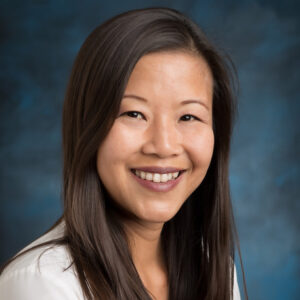

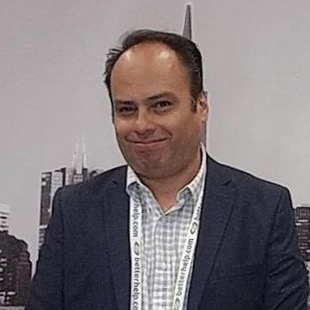

Dear Colleagues and Friends,
If you’ve reached this far into the newsletter, you have taken the time to read through our wonderful submissions in this issue. It has been our commitment on the editorial team to create a space where every voice is heard and respected across our diverse division membership. Our global membership is our greatest strength, and we are committed to ensuring that our content reflects the varied experiences and perspectives of our readers.
We share some exciting developments on the IPB editorial team. You may have noticed that our President’s Letter was a collaborative interview by Dr. Antonio Valdivia. We are fortunate to have Antonio join our IPB team with the goal to enhance our bilingual Spanish submissions. We also welcome team member Gabriel L. Medianero Araúz, who is supporting the newsletter’s Conferences and Workshops section. As part of our ongoing commitment to serving this division’s diverse and global readership, we hope to include more multilingual sections in our newsletter. This expansion is a significant step forward in our mission to provide inclusive and accessible content for all our members, regardless of their language preference. We are thrilled to see this expansion of our IPB team!
We are excited about the possibilities this new team brings and look forward to your continued support as we continue to grow. Thank you for being a part of our community and for your ongoing engagement with our newsletter.
With gratitude and joy,
Joyce, Neha, Antonio, and Gabriel
Please email questions, comments, or suggestions to ipbdiv52@gmail.com. The deadline for submissions for the August issue is July 15th, 2024. The link to the submission guidelines can be found here.

